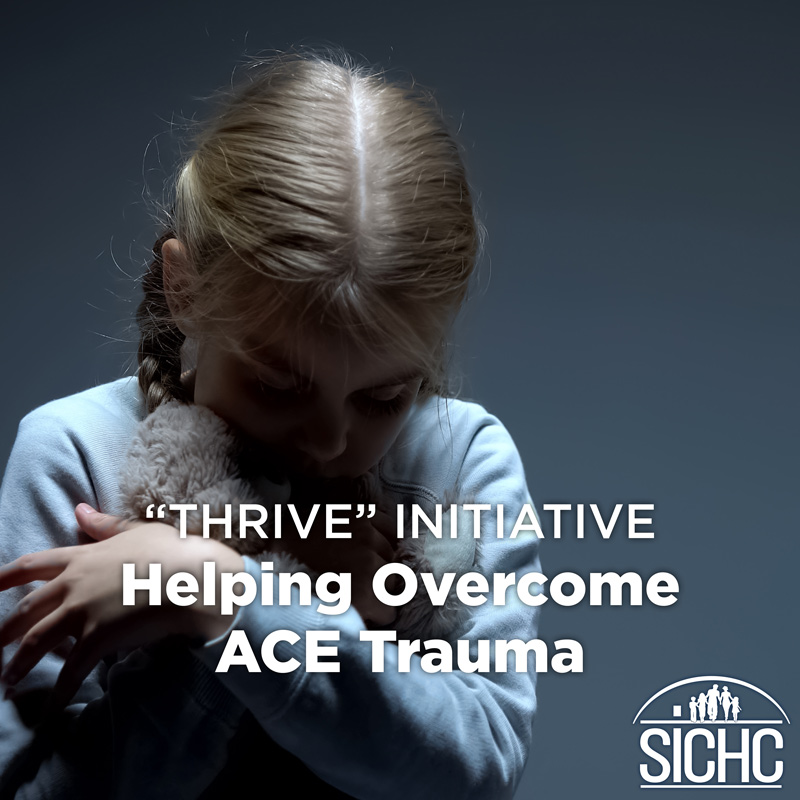SICHC’s “Thrive” initiative: helping overcome ACE trauma

As a parent, you want your children to develop resilience and be able to handle whatever setbacks and challenges they face. But it isn’t as simple as telling them to have a “stiff upper lip” or “learn how to take it” or “quit being a crybaby” when bad things happen.
While not every unfortunate event that children experience can be considered major, there are a significant number that fall under the ACE (Adverse Childhood Experience) umbrella—serious childhood traumas that result in toxic stress that can change brain development and affect such things as attention, decision-making, learning, and response to stress. (Learn more by watching the ACES Primer HD video.)
What are the types of ACEs?
The CDC-Kaiser Permanente Adverse Childhood Experiences (ACE) Study categorized Adverse Childhood Experiences (ACEs) into three groups, the most common of which are:
- abuse: emotional, physical and/or sexual
- neglect: emotional and/or physical
- household challenges: experiencing the divorce of parents, or having a family member who is in jail, has a mental illness or substance abuse problem, or is a victim of domestic violence.
But there are other types of toxic stress as well, notes the ACE and Resilience survey, including the loss of a loved one, homelessness and involvement with the foster care or juvenile justice systems. And it’s also important to know that, according to research results, childhood trauma is very common and can occur in all families, regardless of race, employment status, and income, insurance and education level. (You can view the 10-point ACEs quiz here.)
What are the effects of ACEs?
If an ACE is unidentified, untreated and unresolved, it can have lasting, negative effects on a child’s health, well-being, and opportunity, from increasing the risks of unhealthy lifestyle choices such as alcoholism, drug abuse, violence and other behaviors to a wide range of chronic diseases. Problems can continue into adulthood, making it difficult for the person to form healthy and stable relationships, hold down a job or manage finances.
What treatment and resources are available to treat ACEs?
That’s the bad news. The good news is that ACEs are preventable and if they occur, they are treatable. The sooner a child and the family as a whole receive help, the better the long-term outcome will be for everyone.
Here at SICHC, we are focused on helping our community understand the impact of ACEs and provide parents with the necessary resources and help. In 2019, we sponsored Thrive Orange County, working together with other local stakeholders to improve our community’s health and well-being.
Some of the initiatives that Thrive OC has developed include:
- Handle with Care, a county-wide collaboration between school districts, the sheriff’s department, and town police departments to help students deal with trauma resulting from a family member’s involvement with law enforcement.
- Mindful Schools at Paoli and Orleans schools to help students learn to self-regulate their stress response systems.
- Project Unite Teen Pregnancy Prevention, funded by IU CRE, to reduce the high rate of teen pregnancy in Orange County using community input from parents, the faith-based community, and schools.
- Healthy Relationships and Social Media pilot programs at Orleans Elementary and Mt. Lebanon United Methodist Church.
Thrive OC has brought the Miss Kendra Programs to Springs Valley Elementary Schools in 2020, with funding provided by Springs Valley United Methodist Parish, HealthLinc, and The Tony Bennett Foundation. Two advisory councils have also been established: the Mentoring Advisory Council with a focus on creating a county-wide mentoring program, and the Early Childhood Advisory Council, which will be involved in improving access to quality early childhood education.
Finally, Thrive OC has collected student ACE scores from Orleans, Springs Valley and Paoli students in various grade levels as well as community survey data—all to identify community norms and measure barriers and stigma associated with seeking care or treatment for a substance use disorder, or a mental health condition.
For more information about the Thrive Orange County initiative or to discuss any mental health needs, reach out to our office using our Contact page or by calling one of our office locations.
- After Hours Nurse
- Behavioral Health
- Bill Pay
- Breast Cancer
- Children
- Children's Health
- Chronic Care
- Community
- Covid-19
- Diabetes
- Doctor Visit
- Eating Well / Nutrition
- Financial Wellness
- Follow My Heart
- Grief
- Health Tips
- Heart Health
- Hypertension
- Kidney Health
- Medical History
- Mens Health
- Mental Health
- Motherhood
- Obstetrics
- Pain Management
- Payment Info
- Pediatric Care
- Pregnancy
- Rural Healthcare
- Schools
- Senior Health
- SICHC Services
- Sleep
- Sports Medicine
- Stroke
- Team Based Care
- Telehealth
- Uncategorized
- Virtual Doctor Visit
- Wellness
- What to Know…
- Womens Health
- Pregnancy and Health Information and Resources
- Healthy Pregnancy – A short guide for mothers-to-be
- Summer fun and eating healthy
- Dangers of Teen Vaping – and What You Can Do
- Four health facts for Father’s Day
